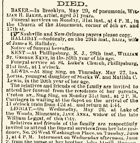 Obituaries often contain information helpful to genealogy research. Unfortunately they’re subject to copyright so you can’t legally transcribe nor share them unless they are in the public domain. The next best alternative to transcribing them is to abstract them.
Obituaries often contain information helpful to genealogy research. Unfortunately they’re subject to copyright so you can’t legally transcribe nor share them unless they are in the public domain. The next best alternative to transcribing them is to abstract them.
A genealogical abstract is a summary of the pertinent details from the source. While some of them are entertaining and well written, your primary interest as a genealogist is in extracting the evidence from the obituary so that you can analyze it with other evidence and reach sound conclusions. Abstracts help you do that and you can share your abstracts without concern over copyright infringement.
I have a system for abstracting obituaries that I’m going to share with you. It consists of a method and a simple template. In the following series of videos I introduce you to the method and template then walk you through abstracting obituaries from different periods to demonstrate the use of the parts of the template and cement the five step process. Two of the obituaries I abstract in the demonstration are from 1851 and 1875 so a transcription would be more appropriate because the material is excluded from copyright protection. I suggest using the method and template a few times after watching the videos to really get it down.
Abstracting an Obituary for Genealogy Research
Part 1
Part 2
Part 3
Here’s the text I have in the template. Copy it and paste it into a plain text file using an editor like Notepad or TextEdit.
Process:
1. As you read the obituary from beginning to end, fill in the boilerplate
2. Remove unused boilerplate and placeholders
3. Edit for flow
4. Verify accuracy of abstractions
5. Copy and paste the abstract into your genealogy database and cite the source
of the obituary
{NAME} of {RESIDENCE} died on {DEATH DATE}{ at/in DEATH PLACE} of {CAUSE} at age {AGE}. {he/she} was born {BIRTH DATE} to {PARENT'S NAMES}{at/in BIRTH PLACE}. Funeral services {FUNERAL DATE at TIME} at {FUNERAL PLACE}. Burial on {BURIAL DATE at TIME} in {BURIAL PLACE}.
{FIRST NAME} was {OCCUPATIONS, EMPLOYERS, and DURATIONS}{, POSITION in/of ORGANIZATION,} and enjoyed {HOBBIES}.{ list of awards and grantors.}{ list of notable achievements.} {he/she} achieved the rank of {RANK} in the {SERVICE BRANCH}. During {WAR}, {RANK} {LAST NAME} was awarded {DECORATION}{ for BEHAVIOR}.
{FIRST NAME} was preceded in death by: {his/her mother/father/parents of RESIDENCE}{; spouse/husband/wife NAME of RESIDENCE...}{; son/daughter NAME of RESIDENCE...}{; brother(s) NAME of RESIDENCE...}{; sister(s) NAME of RESIDENCE...}{; grandchild(ren) NAME of RESIDENCE...}. {he/she} is survived by: {his/her mother/father/parents of RESIDENCE...}{; spouse/husband/wife NAME of RESIDENCE...}{; child(ren) NAME of RESIDENCE...}{; brother(s) NAME of RESIDENCE...}{; sister(s) NAME of RESIDENCE...}{; grandchild(ren) NAME of RESIDENCE...}.
Abstracted by {YOUR NAME} on {DATE}.
Excellent tool!
Thanks, Ben. Great idea and really appreciate the template. However, I’m groaning as I realize how many obituaries I’m going to have to abstract! I always thought that, if I cite the newspaper info, it would be okay to use the full obit. Learn something new every day!
I know this post is pretty old, but the information is pretty useful! Thank you for the tip.